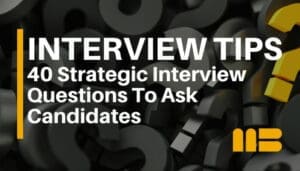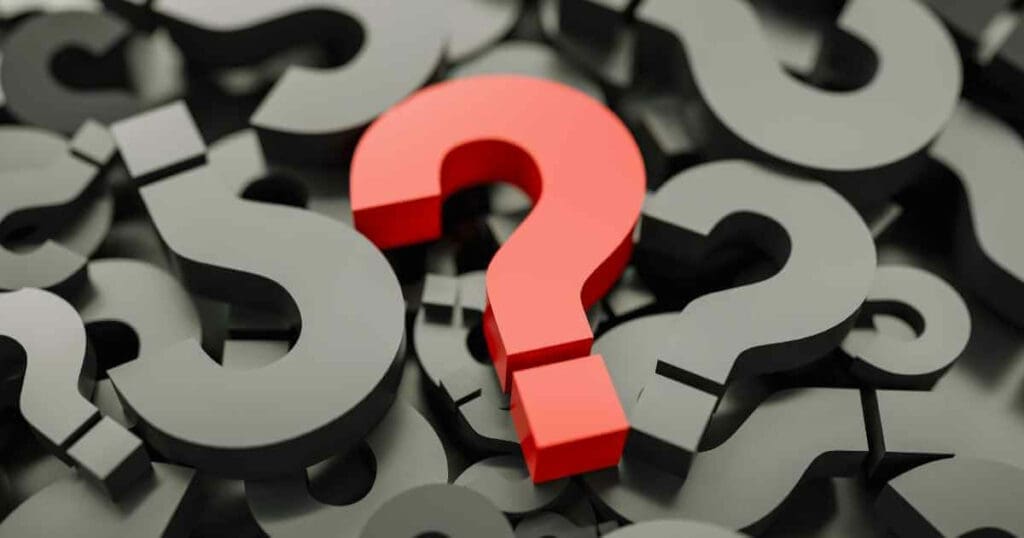As a hiring manager, you understand that your company’s success depends on hiring the right candidates. Strategic questions to ask candidates during a job interview are essential to determine if they are the best fit for the job. However, it can be challenging to identify the right interview questions that reveal a candidate’s strengths, weaknesses, problem-solving skills, and cultural fit.
One of the best ways to create good questions is to involve your team members in the hiring process. They can provide insights into the skills and personality traits needed to succeed in the role. Good questions should be open-ended, allowing candidates to elaborate on their experiences and abilities. Additionally, follow-up questions can help you delve deeper into a candidate’s answer and uncover valuable information.
When crafting strategic questions to ask job candidates, it’s essential to remember the job description and company culture. The best interview questions will assess whether the candidate’s skills and experience align with the position’s requirements and whether they will fit the company’s culture well.
During the job interview, it’s important to look for red flags or warning signs that the candidate may not be the right fit. Pay attention to their body language, tone of voice, and how they respond to questions. A good answer should provide evidence of the candidate’s capabilities and demonstrate how they would approach challenges in the role.
At MatchBuilt, we know from experience that asking the right questions can be challenging. Interviewers often struggle with identifying which questions to ask, how to structure them effectively, and how to interpret the candidate’s responses. Additionally, failing to prepare for an interview can result in missed opportunities to uncover important information about the candidate.
To ensure that you hire the best candidate for the job, it’s crucial to have a strategic hiring process in place that includes asking the right questions. By using best practices and strategic questions, you can identify great candidates who are the right fit for your company. With the right candidate, you can help your company succeed and thrive.
What are the top 5 questions to ask a candidate?
While it depends on the company, opportunity, and candidate, here are the top questions to ask a candidate.
- Can you tell us about your previous work experience?
- Why do you want to work for our company?
- Can you describe a time when you had to deal with a difficult co-worker or client?
- How do you handle stress and pressure in the workplace?
- Tell us about a time when you had to overcome a significant challenge at work.
- What technical skills do you bring to this position?
- Can you explain how you would approach a specific technical problem we may face?
- What experience do you have in this particular field or industry?
- Can you walk us through a project you led that is similar to the work you would be doing in this position?
- How would you handle a specific scenario that is common in this role?
We’re excited to provide this comprehensive guide to strategic interview questions to ask candidates. In this post, we’ll cover four types of questions that can help you hire the best candidate: basic, behavioral, technical, and role-specific. We’ll provide examples of each type of question and discuss what you should be looking for in the candidate’s responses. We aim to help you become a more effective interviewer and find the right person for the job.
Interview Like a Pro: How to Prepare for Strategic Questioning
To conduct a successful interview, it’s essential to be well-prepared. Here are some tips to help you prepare for the interview:
- Review the candidate’s resume: Thoroughly review the candidate’s resume, paying particular attention to their work experience, education, and any relevant skills or certifications. This will give you a better understanding of their background and qualifications.
- Familiarize yourself with the role: Familiarize yourself with the company’s mission, values, and goals. Research the role you’re hiring for, including the key responsibilities, required skills, and qualifications. This will help you tailor your questions to the specific needs of the position and the company.
- Prepare a list of questions in advance: Develop a list of strategic interview questions in advance, including basic, behavioral, technical, and role-specific questions. This will help you stay on track during the interview and ensure you cover all the key topics you need to discuss.
- Leverage the company goals and position goals: Consider the company’s goals and how the position fits into those goals. Consider what the successful candidate will need to achieve in the role, and develop questions to help you assess their ability to meet those goals.
- Reference the job description: Refer to the job description as a guide for your interview. Consider which qualifications and experience are most important for the position, and develop questions to help you evaluate the candidate’s fit for the role.
Mastering the Four Types of Strategic Interview Questions
By preparing for the interview, you’ll be better equipped to ask the right questions and evaluate the candidate’s potential. This will help you find the best candidate for the job and make a successful hire.
Four types of strategic interview questions to ask candidates can help you hire the best candidate for your company: basic, behavioral, technical, and role-specific. Each type of question can provide valuable insights into a candidate’s skills, experience, and fit for the role. Let’s take a closer look at each type of question:
- Basic interview questions: These questions can help establish rapport and get a sense of the candidate’s background. Some common basic interview questions include:
- Can you tell me about yourself?
- What are your strengths and weaknesses?
- Why are you interested in this position?
- What do you know about our company?
- What are your long-term career goals?
When asking basic interview questions, it’s important to pay attention to how the candidate answers the question and the content of their response. Look for clear and concise answers demonstrating self-awareness, communication skills, and an understanding of the company and position.
- Behavioral interview questions: These strategic interview questions to ask candidates will invite them to describe how they handled specific situations in the past and can reveal a candidate’s problem-solving skills, teamwork abilities, and leadership potential. Some examples of strategic behavioral interview questions include:
- Can you tell me about a time when you had to overcome a challenging obstacle?
- Describe a situation in which you had to work with a difficult team member. How did you handle it?
- Give an example of a time when you had to take charge of a project. What did you do, and what was the outcome?
- Tell me about a time when you had to communicate a difficult message to a team or stakeholder.
When asking behavioral interview questions, look for specific examples of the candidate’s past behavior and the results of their actions. Pay attention to how they approach problem-solving, work with others, and handle pressure.
- Technical interview questions: These questions are particularly important for technical roles, as they can help assess a candidate’s knowledge and expertise in a particular programming language, tool, or methodology. Some examples of technical interview questions include:
- Can you explain how you would approach a specific technical problem?
- What coding languages are you most comfortable working with, and why?
- Can you walk me through a recent project you worked on and how you tackled any technical challenges that arose?
- How do you stay current with the latest developments in your field?
When asking technical interview questions, it’s important to tailor your questions to the job’s specific role and technical requirements. Look for clear and concise answers that demonstrate technical proficiency and problem-solving skills.
- Role-specific interview questions: These questions can help assess a candidate’s fit for the job and may vary depending on the specific requirements of the role. For example, if hiring a project manager, you could ask questions about how they prioritize tasks, handle deadlines, and communicate with stakeholders. Some examples of role-specific interview questions include:
- How do you approach project management, and what tools or methodologies do you use?
- Tell me about a time when you had to manage competing priorities. How did you handle it?
- What experience do you have working with [specific software or tools required for the job]?
- Can you describe a project you worked on that required collaboration with other teams or departments?
When asking role-specific interview questions, it’s important to focus on the specific skills and experience required for the role. Look for candidates who can demonstrate relevant experience and a track record of success in similar roles.
You can understand a candidate’s skills, experience, and fit for the job using a combination of basic, behavioral, technical, and role-specific interview questions. Use these questions to guide your interview process, and make sure to stay focused on the company and position goals. Remember to also take note of the candidate’s body language, communication style, and overall demeanor during the interview.
Ultimately, the interview process aims to identify the candidate who best fits the role and the company. Using strategic interview questions and being prepared can increase the likelihood of finding that ideal candidate.
40 Strategic Interview Questions to Ask Candidates
Basic Interview Questions
| Strategic Question | Why Ask | Information Gathered |
|---|---|---|
| Can you tell me about yourself? | Establish rapport and get a sense of the candidate’s background | Overview of candidate’s experience, skills, and achievements |
| What are your strengths? | Identify areas of expertise and potential fit for the role | Areas of expertise and specific skills |
| What are your weaknesses? | Gauge the candidate’s self-awareness and willingness to improve | Areas for improvement and how the candidate addresses them |
| Why do you want to work here? | Assess the candidate’s motivation and cultural fit | Candidate’s knowledge and interest in the company, values, and mission |
| What are your long-term career goals? | Evaluate the candidate’s ambition and fit for the role | Career aspirations and how they align with the company’s mission |
| Can you walk me through your resume? | Assess the candidate’s experience and achievements | Detailed overview of the candidate’s professional background and accomplishments |
| Why do you want to work here? | Test candidate’s research and preparedness | Knowledge of the company’s history, culture, and mission |
| What interests you about this role? | Gauge the candidate’s fit and motivation for the specific position | How the candidate’s skills and experience align with the responsibilities and requirements of the role |
| What was your favorite job and why? | Get a sense of the candidate’s work preferences and cultural fit | Work environment, management style, and specific tasks the candidate enjoyed |
| What salary range are you looking for? | Understand the candidate’s salary expectations and negotiate accordingly | Salary expectations and potential negotiation points |
Behavioral Interview Questions
| Strategic Question | Why Ask | Information Gathered |
|---|---|---|
| Tell me about a time when you had to solve a complex problem. | Evaluates problem-solving skills and ability to handle difficult situations. | Candidate’s approach to problem-solving, the steps they took to address the issue, and the outcome of the situation. |
| Describe a time when you had to work with a difficult team member. | Assesses teamwork and communication skills. | Candidate’s ability to handle conflict, collaborate with others and find common ground to achieve goals. |
| Can you give an example of a time when you had to make a tough decision? | Tests decision-making abilities and judgment. | Candidate’s thought process, the factors they considered, and the outcome of the decision. |
| Describe a situation when you had to go above and beyond to achieve a goal. | Assesses motivation, commitment, and work ethic. | Candidate’s willingness to take initiative, dedication to achieving results, and ability to overcome obstacles. |
| Can you tell me about a project that you led from start to finish? | Evaluates leadership potential and project management skills. | Candidate’s ability to plan and organize tasks, delegate responsibilities, communicate with stakeholders and deliver successful outcomes. |
| Give an example of when you received constructive criticism and how you responded to it. | Tests willingness to learn and adapt to feedback. | Candidates’ ability to handle feedback, take corrective actions, and continuously improve their skills and performance. |
| Describe a time when you had to make a quick decision with limited information. | Assesses critical thinking and problem-solving skills under pressure. | Candidate’s ability to gather relevant information, evaluate options, and make informed decisions in a time-sensitive situation. |
| Can you share a situation when you had to overcome a setback or failure? | Evaluates resilience and ability to handle adversity. | Candidate’s response to failure, the steps they took to recover, and the lessons they learned from the experience. |
| Tell me about a time when you had to persuade someone to see things your way. | Tests communication and influencing skills. | Candidates’ ability to articulate their ideas, listen actively to others, address concerns, and gain support for their proposals. |
| Describe a situation when you had to manage conflicting priorities or demands. | Assesses time management and prioritization skills. | Candidate’s ability to manage multiple tasks, prioritize workloads, and make trade-offs to meet deadlines and deliverables. |
Technical Interview Questions
| Strategic Question | Why Ask | Information Gathered |
|---|---|---|
| Can you explain the difference between procedural and object-oriented programming? | Evaluates the candidate’s knowledge and understanding of different programming paradigms. | Proficiency in programming concepts and ability to apply them to solve real-world problems. |
| What is your experience with version control systems like Git? | Assesses the candidate’s experience and familiarity with a widely used tool in software development. | Technical skills, experience collaborating with others, ability to manage and organize code. |
| Can you walk me through the steps of setting up a database schema? | Evaluates the candidate’s understanding of database design principles and practical skills in working with databases. | Knowledge of SQL, ability to design efficient database structures, and experience with database management tools. |
| How familiar are you with cloud computing technologies like AWS or Azure? | Assesses the candidate’s understanding of cloud computing and their experience with cloud platforms. | Knowledge of cloud infrastructure, experience setting up and managing cloud environments, and familiarity with cloud computing concepts. |
| What is your experience working with BIM (Building Information Modeling) software? | Evaluate the candidate’s experience and proficiency in widely used software in construction and architecture. | Technical skills, knowledge of construction and architecture concepts, and ability to use BIM software to solve real-world problems. |
| How do you approach managing the lifecycle of a construction project using project management software? | Assesses the candidate’s understanding of project management principles and ability to use project management software effectively. | Knowledge of project management concepts, experience using project management software, and ability to prioritize tasks and meet deadlines. |
| Can you describe how you have used 3D modeling software to visualize a building or structure? | Evaluate the candidate’s experience and proficiency in using 3D modeling software, which is essential in architecture and construction. | Technical skills, knowledge of architecture and construction concepts, and ability to use 3D modeling software to solve real-world problems. |
| What is your experience with structural analysis software? | Assesses the candidate’s experience and proficiency in analyzing and designing structures using the software. | Technical skills, knowledge of engineering and structural analysis concepts, and ability to use software to solve real-world problems. |
| Can you explain how you would design a building to be energy-efficient? | Evaluates the candidate’s understanding of sustainable design principles and their ability to apply them to solve real-world problems. | Knowledge of sustainable design concepts and ability to design buildings that conserve energy and reduce environmental impact. |
| What is your experience with project scheduling software like Microsoft Project or Primavera P6? | Assesses the candidate’s experience and proficiency in project scheduling software, which is essential in construction and architecture. | Technical skills, knowledge of project management concepts, and ability to use software to schedule and manage complex construction projects. |
Role-Specific Interview Questions
| Strategic Question | Why ask | Information gathered |
|---|---|---|
| What motivated you to pursue a career in construction/architecture? | Assess the candidate’s interest in the field | Candidate’s passion and commitment to the field |
| Can you walk me through your experience with construction/architecture software? | Evaluate the candidate’s technical skills | Proficiency in software commonly used in the industry |
| How do you handle changes to the design or construction plan? | Evaluate the candidate’s problem-solving skills | Ability to adapt and think on their feet |
| Tell me about a time when you had to resolve a conflict with a coworker or contractor. | Assess the candidate’s conflict resolution skills | Ability to handle difficult situations and maintain professional relationships |
| How do you prioritize tasks and manage your workload on a construction/architecture project? | Evaluate the candidate’s project management skills | Ability to meet deadlines and handle multiple tasks simultaneously |
| Can you explain your experience with (a specific aspect of the role)? | Assess the candidate’s knowledge and experience | Understanding of specific aspects of the role, such as project scheduling or building codes |
| How do you ensure that projects are completed within budget? | Evaluate the candidate’s financial management skills | Ability to manage resources effectively and make strategic decisions |
| Tell me about a time when you had to navigate a complex permitting process. | Assess the candidate’s knowledge and experience | Understanding of the regulatory environment in which the candidate has worked |
| How do you manage communication with stakeholders on a project? | Evaluate the candidate’s communication skills | Ability to communicate effectively with different stakeholders, such as clients, contractors, and regulatory agencies |
| What qualities do you think are important for a successful construction/architecture professional? | Assess the candidate’s understanding of the role | Understanding of the key attributes required for success in the field |
Unlocking the Power of Strategic Interview Questions for Effective Hiring
Conducting a successful interview is crucial in finding the perfect candidate for an open role. To achieve this, it is important to ask the right strategic interview questions to get the best answers from the candidate. There are four strategic interview questions to ask candidates that include basic, behavioral, technical, and role-specific. These types of questions can help you assess a candidate’s skill set, work experience, and behavioral tendencies.
As a recruiter, paying close attention to the candidate’s past experiences and career path is important. Reviewing their resume and job descriptions can help you identify red flags and determine whether they fit the job well. Behavioral questions are a great way to understand a candidate’s emotional intelligence, work environment preferences, and how they handle difficult work situations.
Open-ended questions are a good way to get a great candidate to open up and provide more detail about their past experiences, such as the most interesting project they worked on or the biggest challenges in their current or last job. A great interview question for a leadership role is to ask the candidate how they motivate their team to achieve common goals. A manager interview question may focus on the candidate’s customer service skills and how they handle stressful situations.
Technical questions are important for roles that require specific skills and knowledge. Asking the candidate to describe their understanding of a particular skill or process can help you determine if they have the right answer for the job. Role-specific questions can help you understand how the candidate would approach different situations in the open role.
Finally, asking good questions about a candidate’s motivations can help you identify if they are the perfect candidate for the job or if they may be better suited for a different role. It is important to remember that there is not always an ideal answer to a question, but a great answer may indicate that the candidate is the right choice for the new hire.
At MatchBuilt Executive Search, we understand the importance of asking strategic interview questions during recruitment. We are here to help you find the right person for the job and provide resources and support for career development. Thank you for reading our guide on strategic interview questions to ask candidates, and we wish you the best of luck in your hiring endeavors.




